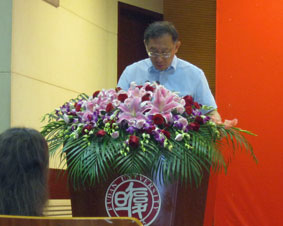 .
. 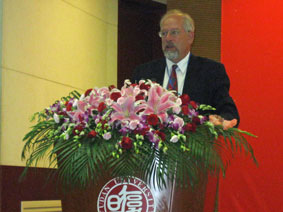 .
. 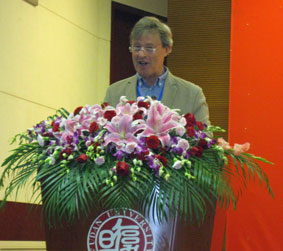
Prof. Lin Shangli, Vice-President, Fudan University; Prof. Philip Vergragt, Coordinator, GRF-SPac; Prof. Trevor Davies, Pro-Vice-Chancellor,University of East Anglia
 .
.  .
. 





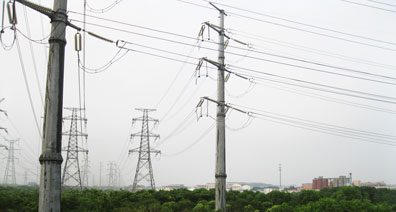 .
. 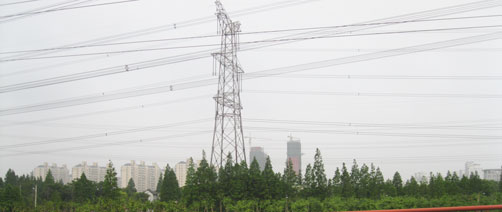
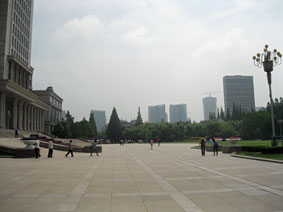 .
. 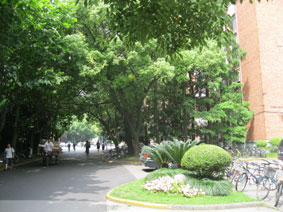 .
. 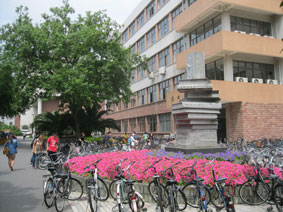
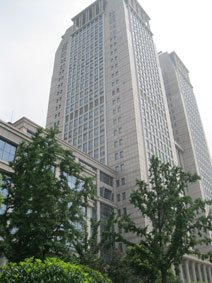 .
. 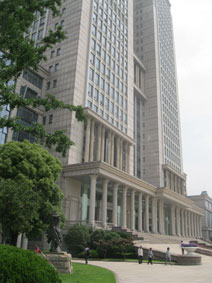 .
.  .
. 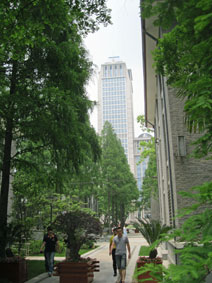
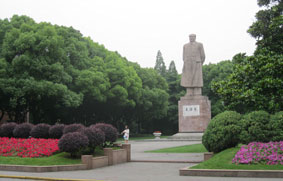 .
. 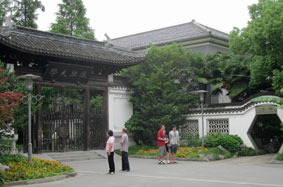 .
. 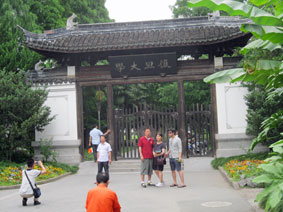
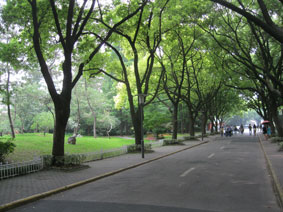 .
. 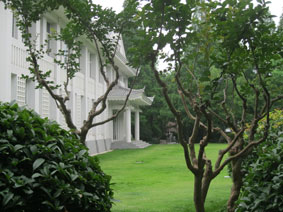 .
. 
 .
. 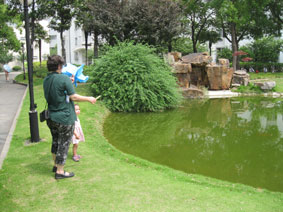 .
. 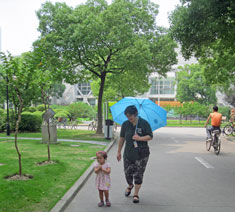
 .
.  .
. 
 .
. 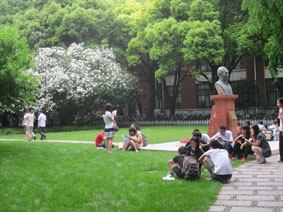 .
. 
 .
.  .
. 
 .
.  .
. 
 .
.  .
. 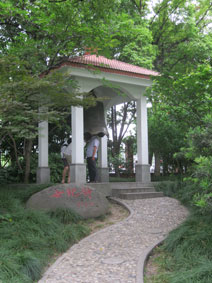
 .
.  .
.  .
. 
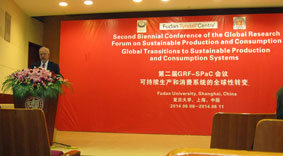 The
2014 Global Research Forum Sustainable Production and Consumption
Conference: Global Transitions to
Sustainable Production and Consumption Systems, was held at Fudan
University, Shanghai, People's Republic of China, on 8-11 June 2014. About a
hundred participants from around the world gathered to explore the
challenges and research opportunities in trying to move the world towards
sustainability. This was the second time I participated in the conference,
after the previous GRF-SPaC (https://iefworld.org/conf16)
in Rio de Janeiro in 2012. There were numerous parallel sessions of papers,
so I focused on the values dimension. More information on GRF-SPaC is at http://grf-spc.weebly.com/.
The
2014 Global Research Forum Sustainable Production and Consumption
Conference: Global Transitions to
Sustainable Production and Consumption Systems, was held at Fudan
University, Shanghai, People's Republic of China, on 8-11 June 2014. About a
hundred participants from around the world gathered to explore the
challenges and research opportunities in trying to move the world towards
sustainability. This was the second time I participated in the conference,
after the previous GRF-SPaC (https://iefworld.org/conf16)
in Rio de Janeiro in 2012. There were numerous parallel sessions of papers,
so I focused on the values dimension. More information on GRF-SPaC is at http://grf-spc.weebly.com/.
After the opening welcomes from Prof. Lin Shangli, Vice-President of
Fudan University, Prof. Philip Vergragt, Coordinator of GRF-SPaC, and
Prof. Trevor Davies, Pro-Vice-Chancellor of the University of East Anglia
(UK) and Director of the Fudan Tyndall Centre for Climate Change Research,
the first keynote talk was given by the distinguished diplomat John
Ashton, CBE, founder of Third Generation Environmentalism and former
Special Representative for Climate Change for the UK Foreign and
Commonwealth Office.
 .
.  .
. 
Prof. Lin Shangli, Vice-President, Fudan University; Prof. Philip
Vergragt, Coordinator, GRF-SPac; Prof. Trevor Davies,
Pro-Vice-Chancellor,University of East Anglia
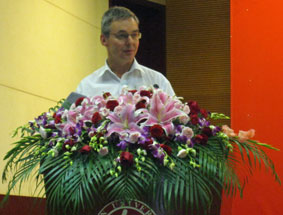 In
a remarkable talk, partly in Chinese and partly in English, on "The
Politics and Diplomacy of Climate Change" which was really his "Chinese
dream", Ambassador Ashton said we must break with our belief in
separation from and dominion over nature, which cannot be exploited freely
and will take revenge. After referring to the four elements of a good, not
sour earth, containing fire and controlling our passions, water as a bridge
not a barrier, and air, he cited the Confucian values of benevolent virtue
and harmony. In the political struggle to control climate change, he
referred to three battles. The first is for climate security linked to food,
water and energy security. With the risk of an early catastrophic collapse
of the West Antarctic ice sheet and a 2 meter rise in sea level in this
century (putting Shanghai and many other cities under water), we risk losing
the capacity to choose our own destiny, but do we have the will? The second
battle is to make the market our steward, not our master. The market has no
goal and produces extremes of wealth, so it cannot take us there. We must
intervene in the market with top-down as well as bottom-up solutions, as
there is no time for bottom-up approaches alone. The third battle is to
decide who we are, how we define ourselves, our souls. We are drunken with
market-driven consumerism. This requires a political and moral choice to
abandon the consumer society. Youth have so little confidence in their
parent's generation that the bridge between generations is broken, and we
must repair it. The world of knowledge must reach out to the world of choice
that is politics. We must win these three battles, but it depends on our
will, and breaking down the barriers between disciplines.
In
a remarkable talk, partly in Chinese and partly in English, on "The
Politics and Diplomacy of Climate Change" which was really his "Chinese
dream", Ambassador Ashton said we must break with our belief in
separation from and dominion over nature, which cannot be exploited freely
and will take revenge. After referring to the four elements of a good, not
sour earth, containing fire and controlling our passions, water as a bridge
not a barrier, and air, he cited the Confucian values of benevolent virtue
and harmony. In the political struggle to control climate change, he
referred to three battles. The first is for climate security linked to food,
water and energy security. With the risk of an early catastrophic collapse
of the West Antarctic ice sheet and a 2 meter rise in sea level in this
century (putting Shanghai and many other cities under water), we risk losing
the capacity to choose our own destiny, but do we have the will? The second
battle is to make the market our steward, not our master. The market has no
goal and produces extremes of wealth, so it cannot take us there. We must
intervene in the market with top-down as well as bottom-up solutions, as
there is no time for bottom-up approaches alone. The third battle is to
decide who we are, how we define ourselves, our souls. We are drunken with
market-driven consumerism. This requires a political and moral choice to
abandon the consumer society. Youth have so little confidence in their
parent's generation that the bridge between generations is broken, and we
must repair it. The world of knowledge must reach out to the world of choice
that is politics. We must win these three battles, but it depends on our
will, and breaking down the barriers between disciplines.
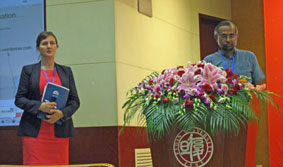 The
second keynote by Ashish Kothari, founder of the Indian environmental
group Kalpavriksh, advisor to the Government of India and IUCN on
biodiversity and indigenous peoples' issues, and widely-published author,
was on "Sustainable Consumption and
Radical Ecological Democracy". He noted that the
corporation-dominated democracies have breached ecological limits while
continuing inequalities and human depravation, with an alienation of
nature that has become a spiritual crisis. He proposed a "sustainable
consumption line" that people should not go over like the "poverty line"
that people should not drop below. Over-consumption equals someone else's
depravation. Consumption is deeply cultural, with market mechanisms that
enrich the rich, who can eat organic, while the poor can only afford junk
food. He defined radical ecological democracy as achieving human
well-being through participation in decision-making with an equitable
distribution of wealth. We need a new economics with ecological limits as
core, production and consumption locally for basic needs, and well-being
indicators. There should be a new culture of knowledge and knowledge of
culture founded in values and principles, relinking with nature and
learning through doing, with a mix of tradition and modernity and a
diversity of approaches in a free exchange of ideas between global and
local. He anticipated further collapse over the next decades, with people
looking desperately for solutions, until we reach a transition point.
The
second keynote by Ashish Kothari, founder of the Indian environmental
group Kalpavriksh, advisor to the Government of India and IUCN on
biodiversity and indigenous peoples' issues, and widely-published author,
was on "Sustainable Consumption and
Radical Ecological Democracy". He noted that the
corporation-dominated democracies have breached ecological limits while
continuing inequalities and human depravation, with an alienation of
nature that has become a spiritual crisis. He proposed a "sustainable
consumption line" that people should not go over like the "poverty line"
that people should not drop below. Over-consumption equals someone else's
depravation. Consumption is deeply cultural, with market mechanisms that
enrich the rich, who can eat organic, while the poor can only afford junk
food. He defined radical ecological democracy as achieving human
well-being through participation in decision-making with an equitable
distribution of wealth. We need a new economics with ecological limits as
core, production and consumption locally for basic needs, and well-being
indicators. There should be a new culture of knowledge and knowledge of
culture founded in values and principles, relinking with nature and
learning through doing, with a mix of tradition and modernity and a
diversity of approaches in a free exchange of ideas between global and
local. He anticipated further collapse over the next decades, with people
looking desperately for solutions, until we reach a transition point.
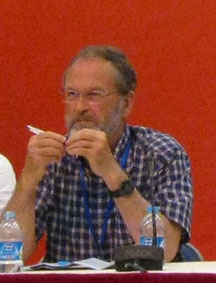 Professor
William Rees, an ecologist, a founder of the field of ecological
economics, Professor Emeritus at the University of British Comunbia, and
co-creator of the ecological footprint, gave the third keynote talk on "Overcoming
Denial: Toward an 'Ecological Civilization'." He started by
showing that the social construction of our economic "reality" based on
endless growth is a circular system with no relationship to anything
outside itself like human relationships or the environment. Its
globalization is oriented to maximize consumption and production, and
unsustainability is an inevitable emergent property of such a system. This
is a fatal model, and we are in denial. Indeed, the "environment" was a
creation by economists to connect marginally with "nature" with little
real connection so that the economy could grow forever. This is a
misunderstanding of reality and does not match the biophysical reality.
Our present economy is parasitic on the rest of nature, so that growth
makes us poorer rather than richer, destroying $20 trillion in ecological
goods and services annually. In the USA, 1% of the population captures 90%
of the new wealth, but people are socially engineered to deny reality in
an "age of unreason". The increasing income gap is breaking down any
residual social trust. Full systems failure is possible when the first
critical resource runs out, and in a globalized economy it will take the
whole world down together. He called for a paradigm shift in beliefs,
values and assumptions with a different representation of reality. If the
purpose is to satisfy the biophysical needs of the people within the
limits of the planet's biocapacity, emphasizing material sufficiency,
regional self-reliance, economic security, relative equity, community
resilience and ecological stability, then sustainability will emerge.
Professor
William Rees, an ecologist, a founder of the field of ecological
economics, Professor Emeritus at the University of British Comunbia, and
co-creator of the ecological footprint, gave the third keynote talk on "Overcoming
Denial: Toward an 'Ecological Civilization'." He started by
showing that the social construction of our economic "reality" based on
endless growth is a circular system with no relationship to anything
outside itself like human relationships or the environment. Its
globalization is oriented to maximize consumption and production, and
unsustainability is an inevitable emergent property of such a system. This
is a fatal model, and we are in denial. Indeed, the "environment" was a
creation by economists to connect marginally with "nature" with little
real connection so that the economy could grow forever. This is a
misunderstanding of reality and does not match the biophysical reality.
Our present economy is parasitic on the rest of nature, so that growth
makes us poorer rather than richer, destroying $20 trillion in ecological
goods and services annually. In the USA, 1% of the population captures 90%
of the new wealth, but people are socially engineered to deny reality in
an "age of unreason". The increasing income gap is breaking down any
residual social trust. Full systems failure is possible when the first
critical resource runs out, and in a globalized economy it will take the
whole world down together. He called for a paradigm shift in beliefs,
values and assumptions with a different representation of reality. If the
purpose is to satisfy the biophysical needs of the people within the
limits of the planet's biocapacity, emphasizing material sufficiency,
regional self-reliance, economic security, relative equity, community
resilience and ecological stability, then sustainability will emerge.
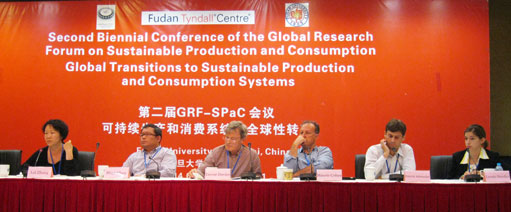
Panel discussion
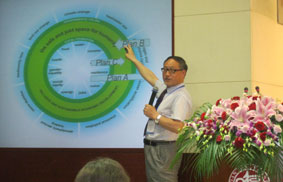 The
final keynote by Professor Dajian Zhu, Professor of Economics at Tongji
University, and involved in policy research projects with the World
Economic Forum, UNDP, UNEP, UNICEF, the World Bank and the Asian
Development Bank, was on "Sustainable
Production and Consumption in China's Green Transition". He cited
statistics on China's expected development, with 1 billion people in urban
areas by 2030, with a GDP per capita twenty times that in 2000. It was
essential to develop a green agenda decoupling economic growth from
environmental impact in order to stay within planetary limits. The
challenge is to convince ordinary people that sustainability is better for
their life.
The
final keynote by Professor Dajian Zhu, Professor of Economics at Tongji
University, and involved in policy research projects with the World
Economic Forum, UNDP, UNEP, UNICEF, the World Bank and the Asian
Development Bank, was on "Sustainable
Production and Consumption in China's Green Transition". He cited
statistics on China's expected development, with 1 billion people in urban
areas by 2030, with a GDP per capita twenty times that in 2000. It was
essential to develop a green agenda decoupling economic growth from
environmental impact in order to stay within planetary limits. The
challenge is to convince ordinary people that sustainability is better for
their life.
Values were a major theme of the conference, with several papers on the
values-based indicators developed with Professor Marie Harder at the
University of Brighton (UK), who is now also a 1000 Talents Professor at
Fudan University. I presented a paper on "The
Ethics
of Hope: Values as Positive Drivers for a Sustainable Future" (https://iefworld.org/ddahl14b).
I also took part in a panel discussion on "Human
Values and the Future of Sustainable Consumption and Production",
and chaired a session on sustainable lifestyles (below).
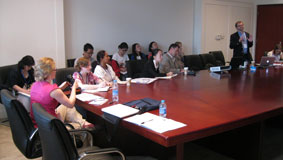 .
. 
Parallel session on values
The session that I chaired on "Sustainable Lifestyles" provided three distinctive and complementary perspectives. Wenling Liu discussed "Sustainable Consumption in China: a conceptual framework and research agenda". Sustainability of consumption and production is not yet visible in China, with its focus on a rise in consumption. It is a complex issue to understand and research, combining as it does individual intentions, the provision of infrastructure, and social practices, and covering domains such as food, energy and transport. There is a lack of links between technical and behavioral considerations, and consumption itself is undergoing a dynamic transition. Integrated frameworks are needed that are specific to China. The second presentation by Shilpa Iyanna on "Everyday sustainable behavior practices of individuals in the UAE" described the challenges of moving towards sustainability in the world's least sustainable country according to its global footprint, the United Arab Emirates. She explained the political issues with sustainable consumption, such as not accepting any drop in consumption or the lack of available choices, so the focus has to be on personal responsibility. This contrasted with the perspective in Japan, presented by Midori Aoyagi in her paper "How people perceive their future lifestyles: the results of our focus group interviews on sustainable lifestyles". Using innovative scenario development of lifestyle trends, she explored how people live their lives and consume in Japan in the context of a decreasing population, a widening gap in income and education with a shrinking middle class and an expanding lower class. She observed shifting values with respect to careers and self-realization, an erosion of the family system with increasing vulnerability to external risks, and shrinking consumption.
Some of the issues raised in the session included how the different cases of expanding consumption, overconsumption and declining consumption illustrated how dynamic the issue is over time. How is it possible to determine a sustainable level of consumption? It is important to distinguish the consumption of the rich who can choose a sustainable lifestyle but do not, and the poor who have little choice and are vulnerable to the lifestyles imposed on them. This highlighted the need to change social systems, not just consumption.
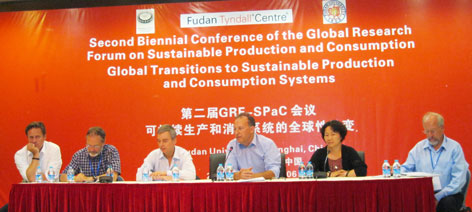 The
conference closed with a panel discussing the "Long-term
Transition
to Sustainable Production and Consumption Systems". Bill Rees
noted that wars and catastrophes can cause rapid change, but social
learning for a new narrative takes decades. How can we speed up social
learning? Knowledge can prepare the way for legislation and regulation to
lay the foundations for a new civilization. John Ashton said that this was
a question of power, who has it and how it is used. The system resists
change in the growth model, as in the case of a university economics
department that refused to teach about the crash of 2008. Individual
action is simply displacement and will not solve the problem, which
requires getting out of fantasy economics into real economics. Maurie
Cohen, one of the conference organizers, noted that Japan was ahead of the
pack, with its youth moving away from conventional values towards
post-consumerism. Philip Vergragt highlighted the need for cultural
change, not just values, with learning processes to offer better visions
of the future, and deep democracy to legitimize the new directions. He
referred to the wisdom of indigenous knowledge systems, and the need to
listen to children. Lars Mortensen of the European Environment Agency
concluded that business could be a partner in the transition, recognizing
the need for new business models, and governments could help to enable
this process.
The
conference closed with a panel discussing the "Long-term
Transition
to Sustainable Production and Consumption Systems". Bill Rees
noted that wars and catastrophes can cause rapid change, but social
learning for a new narrative takes decades. How can we speed up social
learning? Knowledge can prepare the way for legislation and regulation to
lay the foundations for a new civilization. John Ashton said that this was
a question of power, who has it and how it is used. The system resists
change in the growth model, as in the case of a university economics
department that refused to teach about the crash of 2008. Individual
action is simply displacement and will not solve the problem, which
requires getting out of fantasy economics into real economics. Maurie
Cohen, one of the conference organizers, noted that Japan was ahead of the
pack, with its youth moving away from conventional values towards
post-consumerism. Philip Vergragt highlighted the need for cultural
change, not just values, with learning processes to offer better visions
of the future, and deep democracy to legitimize the new directions. He
referred to the wisdom of indigenous knowledge systems, and the need to
listen to children. Lars Mortensen of the European Environment Agency
concluded that business could be a partner in the transition, recognizing
the need for new business models, and governments could help to enable
this process.
There was also a banquet at a nearby hotel, with traditional Chinese
dancing and music.
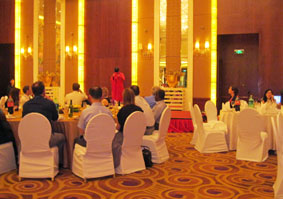 .
.  .
. 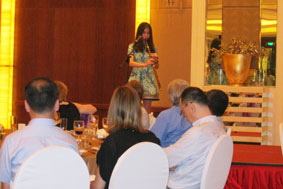
 .
. 